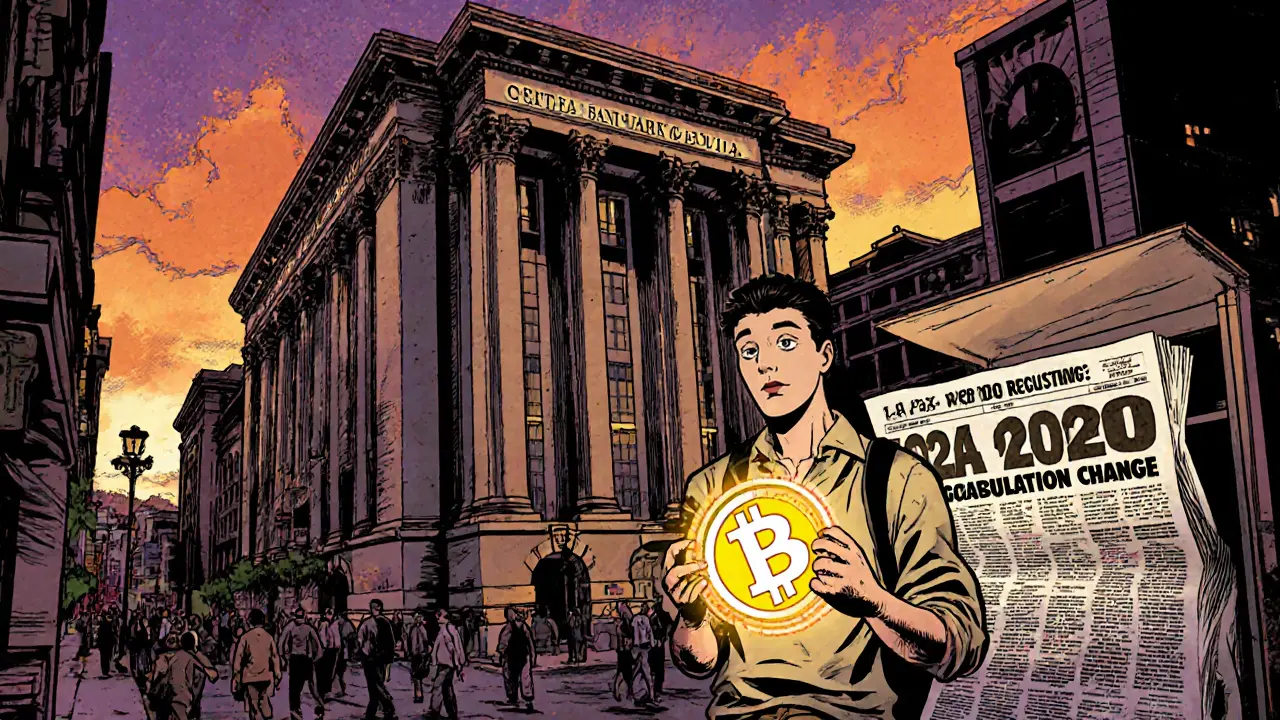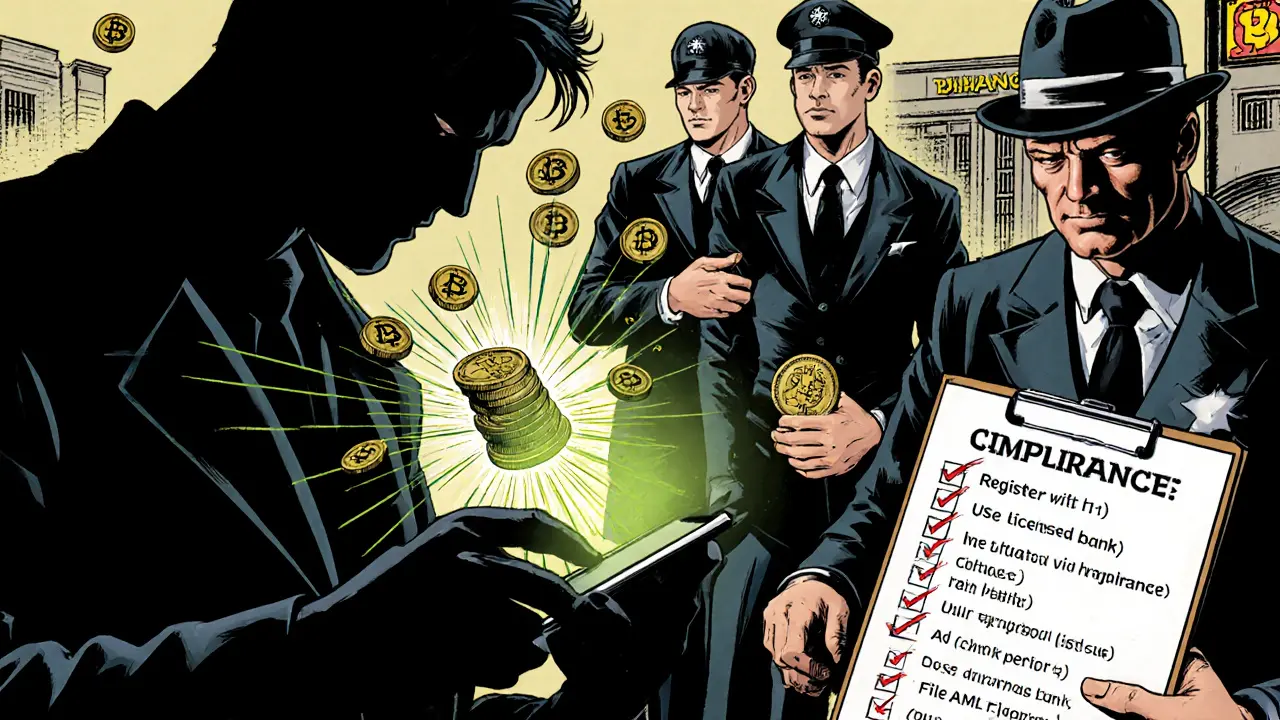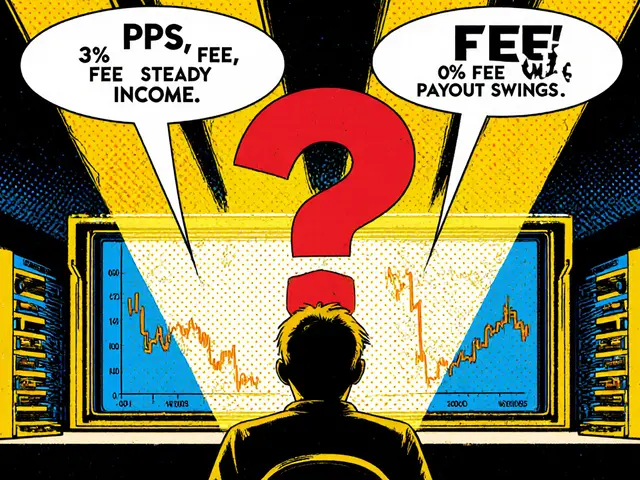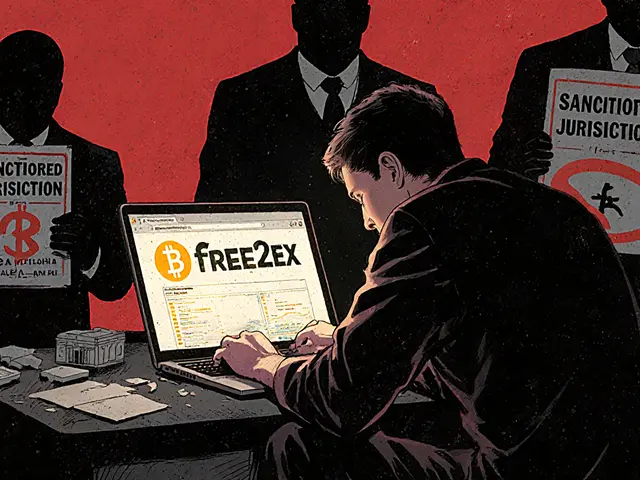
Bolivia Crypto Penalty Calculator
Calculate Your Penalty Risk
If you’re wondering whether a crypto trade could land you in hot water in Bolivia, you’re not alone. The country’s legal stance on digital assets has flipped dramatically over the past decade, and today’s rules carve a very narrow path for traders who want to stay on the right side of the law.
Cryptocurrency trading in Bolivia refers to buying, selling, or exchanging virtual assets such as Bitcoin, Ethereum, or stablecoins through any channel that the state permits is now regulated rather than outright banned. Understanding the current framework, the agencies that enforce it, and the concrete penalties for stepping out of line is essential for anyone looking to invest or operate a crypto‑related business in the country.
From Total Ban to Regulated Acceptance
Back in 2014 the Central Bank of Bolivia (BCB) issued a sweeping prohibition that labeled all cryptocurrencies as illegal. The ban aimed to protect the boliviano and prevent financial instability, but it left traders in a legal gray area-there were no published fine amounts, only a vague threat of enforcement.
Everything changed in June 2024 when Board Resolution N°082/2024 repealed the 2014 ban and introduced a regulated framework for virtual asset transactions. The new rule allowed the use of Electronic Payment Instruments (EPI) for crypto trades, but only through licensed banks and authorized electronic payment channels.
Who Monitors Crypto Activity?
Three bodies now share oversight:
- Central Bank of Bolivia (BCB) acts as the primary regulator, issuing guidelines and supervising banks.
- Financial System Supervisory Authority (ASFI) provides additional supervisory functions, especially for non‑bank entities.
- Financial Investigations Unit focuses on anti‑money‑laundering (AML) and monitors suspicious transactions.
All banks must report crypto‑related transactions daily, cross‑checking each against international sanctions lists and forwarding any red flags to the Financial Investigations Unit.
Authorized Channels: Where Legal Trading Happens
To trade legally, you must go through one of the following:
- Licensed commercial banks that have received permission to process Electronic Payment Instruments for virtual assets.
- Registered crypto exchanges that have completed the mandatory registration with BCB and ASFI. They are required to operate under the bank’s supervision.
- Authorized electronic payment services (E‑Payments) that have a partnership with a licensed bank.
The most visible example is Banco Bisa which launched a stablecoin custody service for USDT in October 2024. The bank holds the tokens in a segregated account and only moves them through the bank’s internal ledger, guaranteeing compliance with the Central Bank’s reporting obligations.
crypto penalties Bolivia: What Happens When Rules Are Broken
While the law does not publish a fixed fine schedule, enforcement actions follow a risk‑based approach. Violations generally fall into three buckets:
| Violation | Possible Sanction | Notes |
|---|---|---|
| Unregistered exchange or service provider | Administrative fine (up to 150 % of monthly revenue) + suspension of operations | Fine amount decided case‑by‑case by BCB |
| Off‑exchange transfer (bypassing licensed banks) | Seizure of assets + criminal investigation | Potential imprisonment up to 2 years if linked to money‑laundering |
| Failure to report suspicious activity | Fine (10 %-30 % of transaction volume) + revocation of license | Applied to banks and registered exchanges |
In practice, the most common enforcement target is the unauthorized use of peer‑to‑peer platforms that sidestep the regulated banking route. The government’s public awareness campaigns stress that while personal holding of crypto is not a crime, moving funds outside the authorized channels is.
Taxation: When Does the State Take a Slice?
Individuals who trade crypto as a hobby or side‑income face no dedicated capital‑gains tax. However, any profit generated from a business‑like activity-mining, staking, or operating a crypto‑exchange- falls under the corporate income tax (CIT) rate of 25 %.
Businesses must also file quarterly AML reports and declare crypto‑related revenues in their corporate tax returns. Failure to declare or to file these reports can trigger the same penalties listed above, plus additional tax penalties ranging from 5 % to 20 % of the understated amount.
Practical Steps to Stay Compliant
- Register any exchange, wallet service, or custodial solution with BCB and ASFI before launching.
- Always route transfers through a licensed bank or an authorized E‑Payment service.
- Maintain detailed transaction logs for at least five years; include timestamps, counterparties, and amounts in both USD‑stablecoin and boliviano.
- Run AML screening on every counterparty against the United Nations sanctions list and the local “high‑risk entities” register.
- File monthly reports via the BCB’s online portal; use the standard XML schema they provide.
- Consult a local tax advisor if you earn income from mining, staking, or any commercial crypto activity.
Following these steps not only reduces the risk of a fine but also builds trust with banks that are increasingly wary of illicit crypto flows.

What the Numbers Tell Us
Since the ban was lifted, the Central Bank reports a 630 % surge in crypto transactions. Monthly volumes climbed from $15.6 million in late 2024 to an average of $22.4 million in the first quarter of 2025. Individual users account for 86 % of transfers, and men make up three‑quarters of the active trader base. The dominant platforms remain Binance and local exchanges that have secured BCB registration.
Looking Ahead: Possible Changes
Bolivia’s Memorandum of Understanding with El Salvador’s CNAD hints at future regulatory tweaks-perhaps tighter AML thresholds or a clearer penalty schedule. Keep an eye on BCB circulars, especially those released after quarterly board meetings, as they often fine‑tune the reporting requirements for stablecoins and emerging tokens.
Quick Checklist for Crypto Traders
- ✅ Verify the exchange is registered with BCB and ASFI.
- ✅ Use only licensed banks for deposits and withdrawals.
- ✅ Keep transaction records in both USD‑stablecoin and boliviano.
- ✅ Report any suspicious activity to your bank within 24 hours.
- ✅ File tax returns if you earn income from mining, staking, or crypto‑related services.
Stick to this list, and you’ll minimize the chance of facing the enforcement actions outlined above.
Is it illegal to own Bitcoin in Bolivia?
Owning Bitcoin is not a crime, but you cannot use it for payments or move it outside the approved banking channels without risking enforcement.
Which stablecoins are currently allowed?
USDC and USDT are the most widely accepted stablecoins, provided the transaction goes through a licensed bank or a registered exchange.
What are the penalties for using a peer‑to‑peer platform?
Authorities can seize the assets, impose an administrative fine (often up to 150 % of monthly revenue), and even press criminal charges if money‑laundering is suspected.
Do I have to pay tax on crypto profits?
Individual traders do not face a specific capital‑gains tax, but any profit from a crypto‑related business is taxed at the corporate rate of 25 %.
How can I register my exchange with the regulators?
Submit an application to the Central Bank of Bolivia, attach your AML policy, provide details of your technology stack, and await approval from both BCB and ASFI.






There are 23 Comments
Dimitri Breiner
Great rundown of the new Bolivian framework. I especially appreciate the clear breakdown of who oversees what – it can get confusing fast. For anyone looking to launch a service, the registration steps with BCB and ASFI are non‑negotiable. Keeping detailed logs for five years is a solid habit that will pay off if regulators ever audit. Bottom line: stay on the licensed path and you’ll avoid the scary fines.
Karla Alcantara
This is exactly the checklist I needed before I talk to my bank.
Jessica Smith
The penalties listed are terrifying. No one should ignore them.
Petrina Baldwin
Good info. Keep it short.
Ralph Nicolay
The transition from an outright ban to a regulated environment illustrates a significant policy shift. It is imperative that any entity dealing with virtual assets obtains the requisite licenses from both the Central Bank and ASFI. Moreover, the mandatory daily reporting protocol underscores the authorities’ vigilance. Compliance, therefore, is not optional but a foundational requirement.
sundar M
Hey folks, love seeing Bolivia finally embrace crypto with a sensible rulebook. The partnership between banks and exchanges looks promising, especially with Banco Bisa stepping up. Just remember to funnel every trade through a licensed channel – that’s the golden rule. If you’re unsure, hit up a local advisor before moving any funds.
Nick Carey
Honestly, this whole thing feels like a bureaucratic nightmare. They keep adding layers of reporting that most startups can’t handle. If you’re not ready to juggle paperwork, maybe stick to holding crypto off‑chain.
Sonu Singh
Yo, quick tip – when you fill out the BCB portal, double‑check the XML schema version. I once sent a file with a missing tag and got a reject notice for a week. Also, keep a backup of all your AML screening reports, just in case they ask. Thx!
Peter Schwalm
Solid summary! For anyone starting a crypto service, the registration process can seem daunting, but the step‑by‑step checklist here makes it manageable. Remember, the key is transparency with the Central Bank.
Marianne Sivertsen
It’s interesting how the legal landscape reflects a broader philosophical shift toward regulated innovation. While the rules are strict, they also provide a clear path for legitimate actors. Think of it as a contract between the state and the market, balancing freedom and security.
Shruti rana Rana
Este análisis es una muestra clara de cómo Bolivia está modernizando su enfoque financiero. La colaboración entre bancos y exchanges es esencial para crear confianza. 👏💼 Además, la claridad en los requisitos de reporte facilitará la supervisión. ✨
olufunmi ajibade
From an inclusive mentorship perspective, the emphasis on AML screening cannot be overstated. New entrants must embed robust sanctions checks into their onboarding pipelines. Failure to do so not only risks fines but also damages reputational capital. Moreover, the five‑year log retention policy aligns with global best practices. I’d encourage anyone building on this ecosystem to allocate resources early for compliance tooling.
Manish Gupta
Curious about the practical steps for a small startup – is the XML schema something a developer can handle in‑house, or do you need a consultant? 🤔
Cyndy Mcquiston
Hire a consultant if you’re not comfortable with the XML nuances.
Rampraveen Rani
Let’s keep the energy up! 🚀 The new rules actually give us a chance to innovate responsibly. Just remember: every transaction must go through a licensed bank – no shortcuts! 🌟
Natasha Nelson
Got it, no shortcuts.
Sarah Hannay
It is incumbent upon all market participants to observe the regulatory directives promulgated by the Central Bank of Bolivia. The imposed sanctions, particularly the administrative fines reaching up to 150 % of monthly revenue, constitute a formidable deterrent. Accordingly, diligent adherence to licensing protocols and reporting obligations is essential. I trust that stakeholders will therefore act with due diligence.
Prabhleen Bhatti
When evaluating the Bolivian crypto regime, one must first contextualize the historical prohibition that lasted a full decade. The 2014 ban, though well‑intentioned, created a black market that operated in the shadows, hampering data collection and risk assessment. Fast‑forward to June 2024, the Board Resolution N°082/2024 replaced that blanket ban with a nuanced, licensing‑centric model. This shift acknowledges the inevitability of digital assets while imposing safeguards to protect macro‑economic stability. Central to the new model is the requirement that all electronic payment instruments for crypto are processed exclusively through banks authorized by the BCB. In practice, this means that any exchange wishing to operate must obtain a dual licence from both the BCB and the Financial System Supervisory Authority (ASFI), thereby subjecting it to rigorous supervisory oversight.
Compliance obligations are extensive. Licensed entities must file daily transaction reports via the BCB’s online portal, adhering to a prescribed XML schema that encodes transaction identifiers, timestamps, counterparties, and both USD‑stablecoin and boliviano amounts. Failure to submit these reports within the stipulated window triggers escalating penalties, starting with formal warnings and potentially culminating in fines calculated as a percentage of the entity’s monthly revenue. Moreover, the Financial Investigations Unit retains the authority to freeze assets and initiate criminal investigations should suspicious patterns indicative of money‑laundering emerge. The punitive regime delineated in the recent legislation categorizes violations into three primary buckets: unregistered service provision, off‑exchange transfers that bypass licensed banks, and neglect of suspicious activity reporting. Each carries distinct sanction tiers, ranging from administrative fines up to 150 % of monthly revenue, to asset seizure and imprisonment for offenses linked to illicit financing.
From a tax perspective, the law draws a clear demarcation between casual, hobby‑level trading and business‑oriented activity. While individual investors who merely hold or trade small volumes for personal gain enjoy an exemption from dedicated capital‑gains tax, entities engaged in mining, staking, or operating exchanges are subject to the corporate income tax rate of twenty‑five percent. This distinction underscores the regulator’s intent to tax profit‑generating enterprises while fostering a low‑barrier environment for private enthusiasts.
The practical implications for market participants are profound. First, any nascent exchange must allocate resources toward legal counsel and compliance infrastructure before launch, as the approval process can extend several months. Second, existing peer‑to‑peer platforms that previously operated on a decentralized basis must either cease operations or transition to a licensed model, lest they face severe enforcement actions. Third, users must internalize the necessity of routing every deposit and withdrawal through a licensed bank or an authorized electronic payment service, as direct wallet‑to‑wallet transfers outside this framework are deemed illicit. Finally, the regulatory landscape remains dynamic; ongoing dialogues between Bolivia and neighboring jurisdictions, such as El Salvador’s CNAD, suggest future refinements, potentially tightening AML thresholds or clarifying the penalty schedule. Stakeholders should therefore engage in continuous monitoring of BCB circulars and be prepared to adapt operationally.
In summary, the evolution from prohibition to regulated acceptance presents both opportunities and obligations. By embracing the licensing regime, maintaining meticulous records, and adhering to reporting mandates, market actors can participate confidently in Bolivia’s burgeoning crypto ecosystem while mitigating exposure to substantial fines or criminal liability.
Elizabeth Mitchell
Nice deep dive; definitely something to bookmark for the team.
Chris Houser
Appreciate the extensive analysis – the breakdown of the XML reporting requirement is especially helpful for our dev squad.
William Burns
One must acknowledge the sophistication inherent in Bolivia’s regulatory architecture, which undeniably surpasses the rudimentary frameworks observed in many neighboring economies. The tiered sanction structure, coupled with an explicit licensing schema, reflects a commendable commitment to financial integrity. Nevertheless, the procedural latency associated with dual licensing may impede agile market entry for innovative ventures. It is advisable for prospective operators to allocate ample lead time for compliance validation.
Ashley Cecil
While the regulatory intent is laudable, the execution timeline must be calibrated to avoid stifling entrepreneurial momentum.
John E Owren
Remember, staying on the right side of the law protects both your business and your customers.
Write a comment
Your email address will not be published. Required fields are marked *